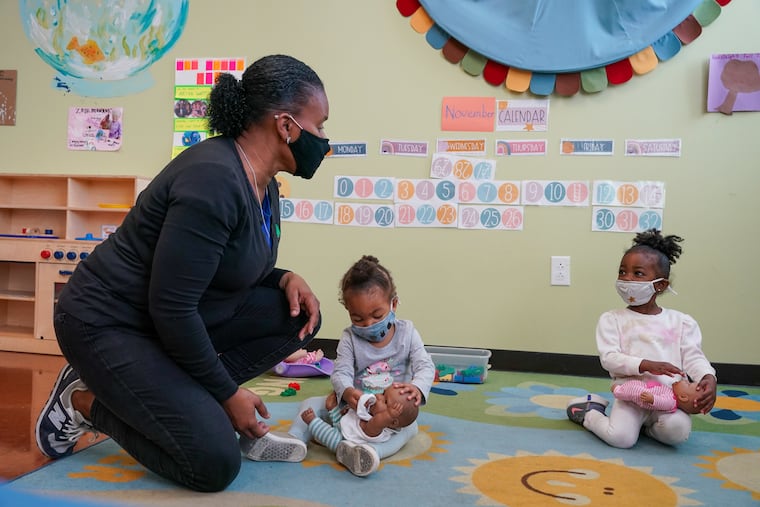In Philly, most families pay more than $10,000 per year for infant child care. This has to change. | Opinion
Yuan He, a pediatrician, struggled to find good, affordable child care for her son. Imagine how hard it is for everyone else.

I am a pediatrician, a health policy researcher, and a first-time mom. Lucky to have paid family leave, I took three months to learn how to breastfeed, bond, and care for our new son — and look for child care. Even before I was pregnant, I had heard from friends and colleagues that it was a tough process. “Get on a wait list if you’re even thinking about having kids,” I was told, as I heard about two-year wait lists at some centers. “Child care costs more than our rent.”
In Philadelphia, the median cost per year to enroll an infant in child care is $10,920 — which includes child care that isn’t high quality. As I looked at local options to enroll my 3-month-old son, I was shocked to see that the high-quality child-care center around the corner would cost us over $25,000 per year. Many places charged a nonrefundable fee of up to $100 just to get on the wait list.
Public polling shows that over 80% of American voters support universal access to pre-K and more financial support to help working families pay for child care, and believe it’s a good use of taxpayer money. They’re right: Comprehensive, high-quality early childhood programming has an estimated 13% return on investment. It’s not hard to see why. Better access to affordable, high-quality child care would not only improve school readiness — needed both here in Philadelphia and more broadly in the United States — but would also allow parents of young children to enter or reenter the workforce, decreasing the labor shortage and contributing to job growth.
“Public polling shows that over 80% of American voters support universal access to pre-K and more financial support to help working families pay for child care, and believe it’s a good use of taxpayer money. They’re right.”
But the question “What will it cost us to invest in child care?” seems to get much more play in the press, sending a subliminal message that the costs may outweigh the benefits.
While wait lists for day cares were already notoriously long before COVID-19, pandemic-related day-care closures and difficulty recruiting staff have made the search for quality child care near impossible. Parents of color and those who experience low income have even worse access to quality child care, as they are more likely to work nontraditional hours, live in “child-care deserts” that lack adequate licensed child-care providers or slots, and struggle to manage the enormous costs. Working families and child-care workers alike are struggling to make ends meet.
As a pediatrician and researcher who focuses on improving outcomes for children and families, I know that participation in high-quality child-care and education programs is linked to better health, development, and education outcomes, including a lower risk of child maltreatment, higher rates of high school graduation and college enrollment, lower rates of juvenile arrest, and lower rates of substance use as young adults. Increased access to these programs can also narrow racial/ethnic and socioeconomic disparities and help reduce the achievement gap.
I work in this space and I struggled to find quality child care for our son. Imagine how hard it is for everyone else.
» READ MORE: Pennsylvania’s child care and staffing crisis, by the numbers
Expanding access to these programs should be a no-brainer, but that requires investment. Child care is expensive because providing care — especially quality care — is expensive. It costs money to recruit and train qualified staff, maintain safe spaces, toys, and equipment, and follow new COVID-19 safety and testing protocols; it costs even more to meet or exceed quality standards to provide quality nurturing care that fosters early learning and development. Significant federal and state investments are needed to subsidize these costs and build the quality child-care infrastructure we so sorely need.
As the Senate considers the Build Back Better Act — the so-called “social infrastructure bill” — and potential changes needed for the bill to pass, the stakes could not be higher for our chronically underfunded early childhood education system. As written, the bill promises to cap child-care costs to 7% of income for low- and middle-income families, and provide universal, high-quality preschool to all 3- and 4-year-olds. Both provisions are needed to ensure adequate and equitable support for child-care workers and families.
The lack of affordable, quality child care is holding back our children, working families, and the economy, and is a critical equity issue that disproportionately impacts working mothers and families of color. American voters on both sides of the aisle should demand that their representatives work toward what the public wants, not against. The United States is far behind other countries when it comes to early childhood education. American families deserve better and cannot wait any longer.
If we don’t act now to secure the future of our children, what else will it cost us?
Yuan He is a postdoctoral research fellow in the National Clinician Scholars Program at the University of Pennsylvania, a primary care pediatrician, and a mom in Philadelphia.